Socialites of Hellas

B. Spranger. Phyllis and Aristotle
Ancient Greek getters are often considered public women, but this opinion is deeply erroneous, getters in Athens, Corinth, and other cities of Hellas occupied a completely different, rather unique position.
The very word "getera" means "girlfriend", "companion". The word “heteria” (“partnership”) is the same root to it - this is how aristocratic unions created to oppose the demos were called in ancient Greek policies. And the getairs are an elite military unit, the horse guards of the Macedonian kings. The last commander of the hetairoi of Alexander the Great was Perdiccas, who after his death, albeit for a short time, became the regent of the empire of the great conqueror.
In one of his speeches, Demosthenes says that Athenian citizens take wives "in order to have legitimate children from them, and also in order to have a faithful guardian of their property in the house", concubines - "for the sake of daily bodily needs", and hetaera "for the sake of enjoyment."
Note that this "enjoyment" is clearly and distinctly separated from the "daily bodily needs." In some books of modern authors, one can read such a translation of the words of Demosthenes: "we get heterosexuals for spiritual comfort."
It is known that the great ancient Greek poet Pindar, whose odes were considered the highest award to the winners of the Olympic and other Greek games, wrote a hymn dedicated to the getters.
Communication with the getters was primarily of an intellectual nature: they could keep up the conversation on any topic - from the poetry of Homer and Stesichorus to the burning problems of the modern political situation in their native polis and all of Hellas. But they could also entertain the guest with playing musical instruments or dancing.
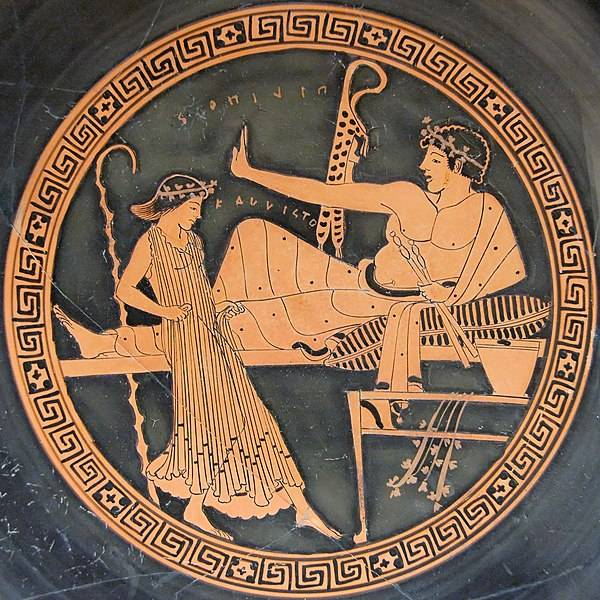
Hetera dancing at a symposia, red-figure painting on a kylix, circa 490–480. BC e.
Prominent politicians, successful commanders and distinguished guests of the policy did not hesitate to visit the houses of the getters. The famous Corinthian hetaera Lais (model of Apelles) said:
At the same time, intimate relationships with hetaerae were by no means guaranteed: they entered into them of their own free will - sometimes they demanded a lot of money, sometimes for free. So, they assure that the beggar philosopher Diogenes used the unfailing "favor" of the above-mentioned Lais.
The position of women in ancient Greece was unenviable - they were in the complete power of their fathers or spouses. The exceptions were Spartan women and getters: F. Engels called both of them
("The Origin of the Family, Private Property, and the State").
By origin, hetaerae were close to the so-called "ladies of the half world", but in terms of the degree of influence on the life of the policy, they can rather be recognized as a kind of analogue of the "secular lionesses" of past centuries - like Juliette Recamier, Teresa Tallien and Anna Josepha Tervan (but not impostors like K. Sobchak). One of the hetaera once said to Socrates:
Socrates agreed with her, answering that this is quite understandable and understandable, because she "leads from the mountain", he also makes "climb the mountain of virtue, and this is a steep and unusual road for most."
Marriage with a hetero was not considered shameful. Let's talk about some of them.
Aphrodite Apelles
Lais, a native of Sicily and the famous getter of the XNUMXth century BC. e., in childhood during the Peloponnesian War fell into slavery and was brought to Athens. Here it was bought by the famous artist Apelles. The acquisition was very successful, because the girl grew up so beautiful that Apelles began to write the goddess of love Aphrodite from her. Having received freedom, Lais was trained at the Corinthian school of getters and turned out to be an extremely capable student. As a hetaera, she was known not only in Greece, but also in Persia and Egypt.
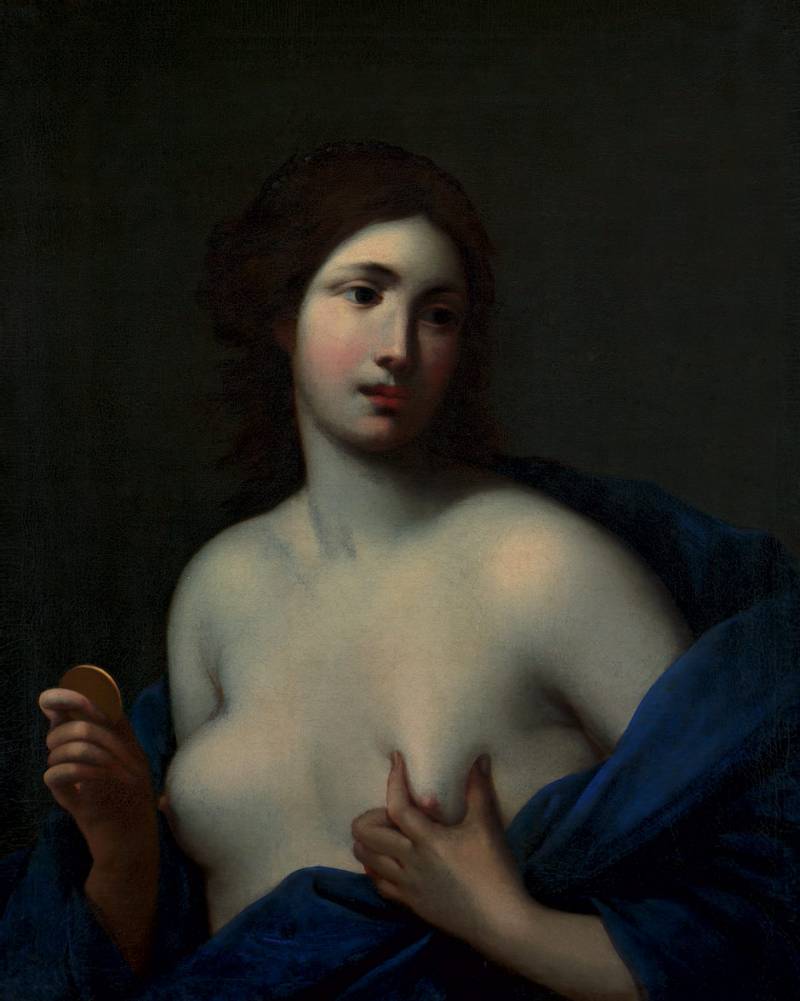
"Lais of Corinth or Allegory of corrupt love", XVII century, painter of the school of Francesco Furini
We remember that she “gave love” to Diogenes for free, but from Demosthenes for a single night she demanded ten thousand drachmas, mockingly advising him, in case of lack of funds, to take them from the Athenians who love him.
According to Plutarch, the aged Lais followed her beloved Hippolochus to Thessaly, where she was killed by local women. Since during her lifetime she brought generous gifts to Corinth and donated significant funds to the local temple of Aphrodite, the inhabitants of the city erected a symbolic monument to her, depicting a lioness tearing a lamb. And on the site of her death, a tomb was built with the inscription:
Aphrodite Praxiteles
The real name of this hetaera is from the XNUMXth century BC. e. - Mnesareta ("Remembering the virtues"), but she is much better known as Phryne, the model of two great creators of Hellas - Apelles and Praxiteles. You will probably be surprised to learn that this nickname means ... "Toad." Some believe that it was given by ill-wishers for the yellowish color of the skin, others - that it was protective in nature - in order to mislead envious spirits.
This woman was born in the city of Thespius dedicated to the Muses, but settled in Athens. Fans paid so much money for communicating with her that Phryne became the richest woman in Hellas. Athenaeus and Callistratus report that she even offered to the inhabitants of Thebes at her own expense to rebuild the walls of the city, destroyed in 336 BC. e. Alexander the Great. But the Thebans did not like the condition of Phryne, who demanded that a memorial plaque be erected with the inscription: "Thebes was destroyed by Alexander and restored by Phryne." And this offer was rejected.
Phryne was very choosy in relationships, they say that once she appointed the death of an applicant as a payment for a night of love. The “challenge” was accepted by the orator Hyperides, who in the morning really decided to drink poison, but Phryne took the cup from him.
Such adherence to principles almost caused the death of this hetaera. According to Athenaeus, the rich Euthius, rejected by Phryne, declared that by publicly stripping herself during a holiday in honor of Aphrodite, she commits sacrilege, offends the gods and corrupts the people. According to legend, the same Hyperides during the trial asked Phryne to take off her clothes - and the judges recognized that such a perfect body cannot hide an imperfect soul.

Jean-Leon Gerome. "Hetera Phryne in front of the Areopagus"
But Posidipp in the play "The Ephesian" gives a different version of those events, and many modern researchers consider it more reliable:
She, sobbing, begged for her life.
At the same time, they talk about Phryne’s unsuccessful attempt to seduce Plato’s student Xenocrates into a dispute: on this occasion, she later stated that she “wanted to arouse passion in a person, and not in a statue.”
At the same time, Plutarch claims that this hetaera was by no means a depraved woman and was highly respected in society:
As we have already said, Phryne became a model for two great creators of Hellas. The first was Praxiteles, for whom she posed during his work on the famous statue of Aphrodite. Pliny stated:
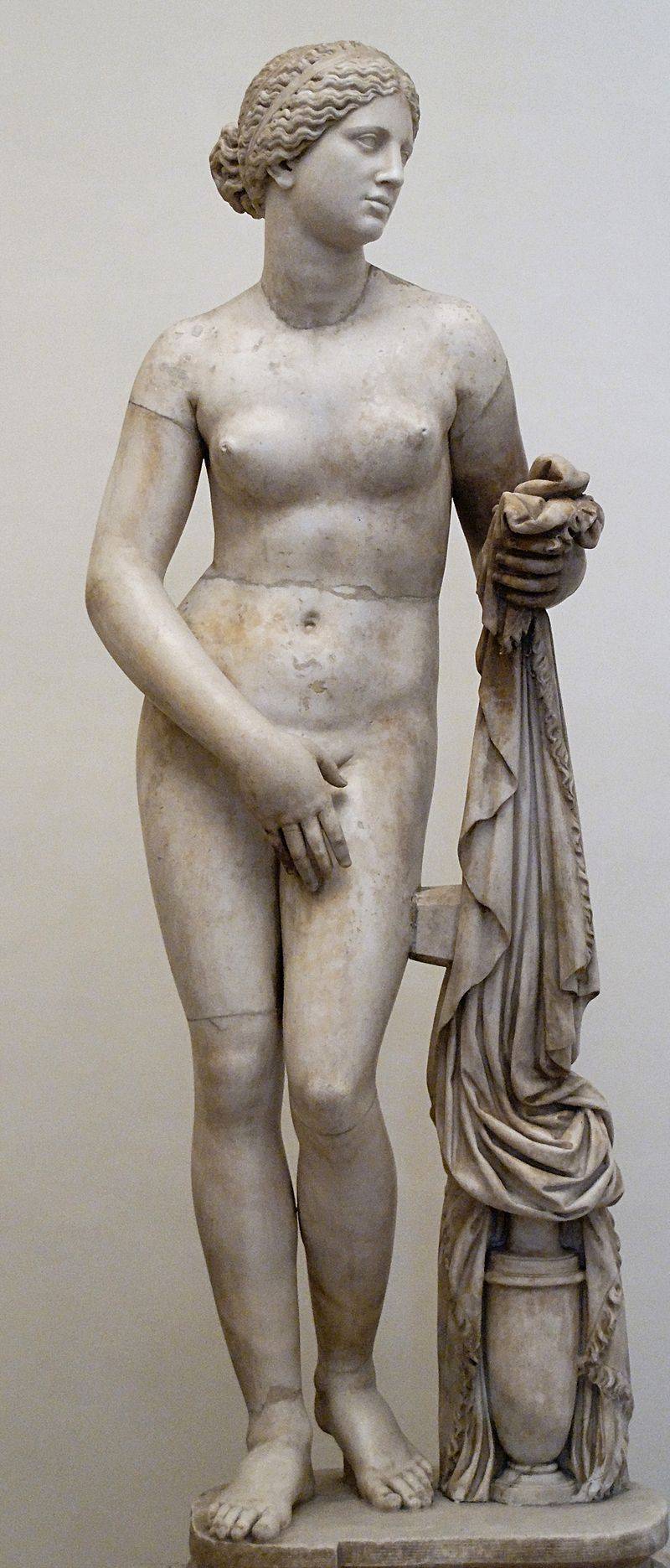
Pausanias reports that Praxiteles promised Phryne any statue from his workshop as a reward:
“If Satyr and Eros burn, I am dead,” the sculptor began to tear his hair, but then Phryne admitted that it was a fiction, and said that she was taking Eros for herself.
Alkifron claimed that Phryne presented this statue to her native city, but later she was taken to Rome by Caligula. After the death of this emperor, the statue was first returned to Thespius, but Nero again took it. It is reported that this sculpture perished during the Roman fire of 80 AD.
Later, Apelles painted from Phryne a picture of Aphrodite Andiomen (“Born from the Sea Foam”). An alleged Roman replica of this painting has been found in Pompeii.
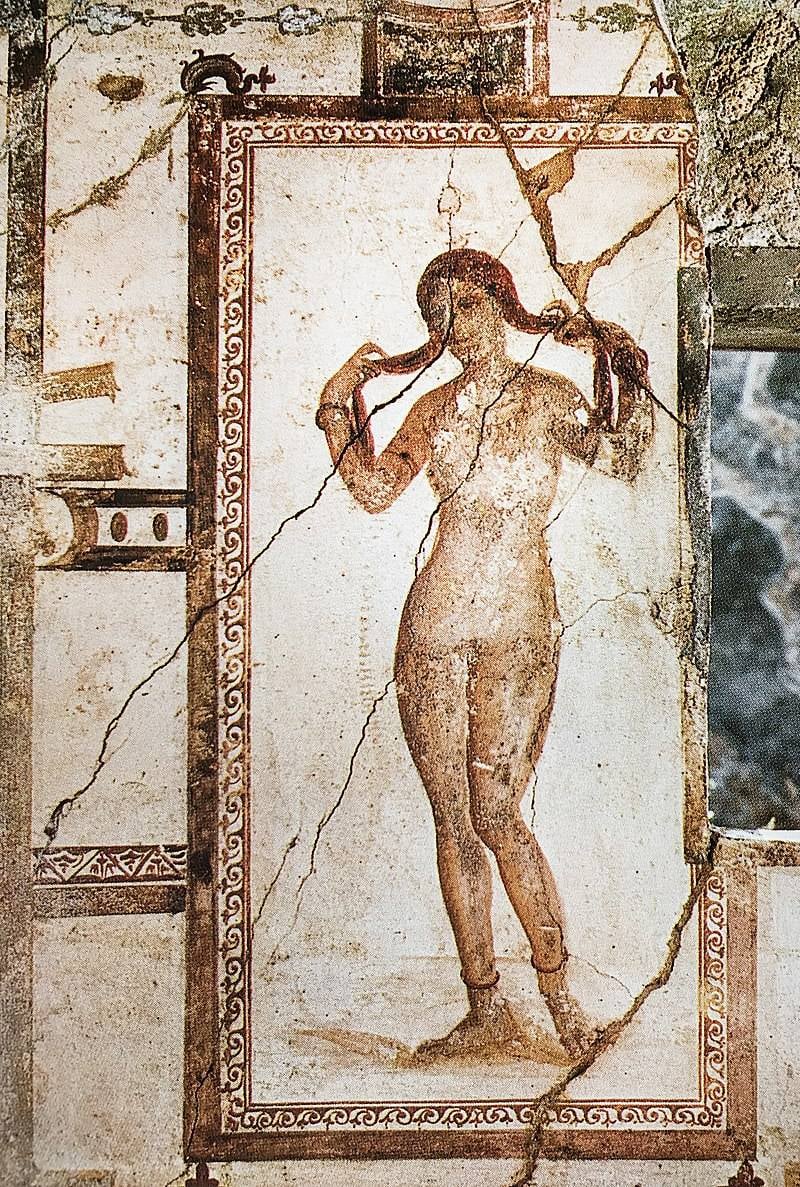
Aphrodite Anadyomene, Roman copy, fresco in Pompeii
Wife of Pericles
Aspasia (literally translated, this name means “Affectionate”) is often called, if not the most famous, then the most influential of the hetaerae.
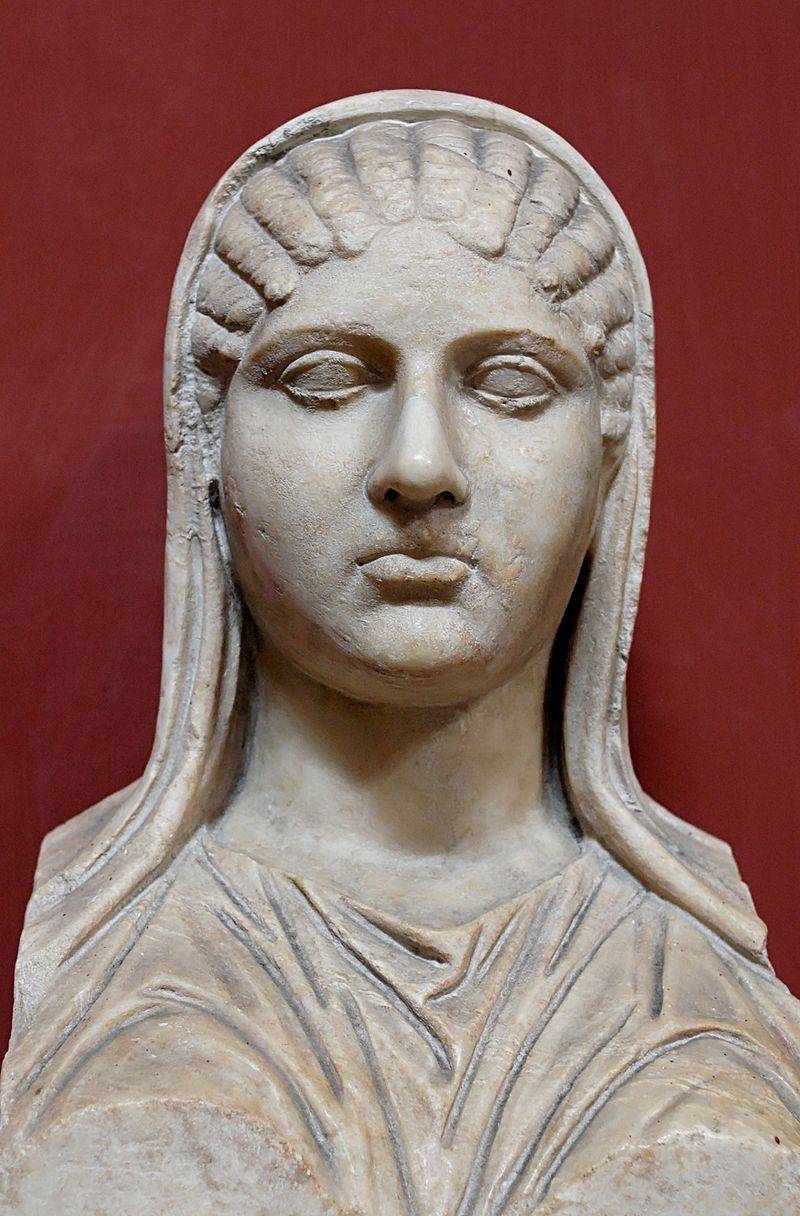
Roman copy of a herm with a bust of Aspasia, Rome, Pio-Clementino Museum
Arriving in the 440s. BC e. to Athens from Miletus, which was then called the "kingdom of geters", she opened in this city a real secular salon, to which Anaxagoras, Sophocles, Zeno, Protagoras, Euripides, Phidias, Herodotus, Socrates, Pericles and Alcibiades regularly came. Plutarch states:

Michel Corneille Jr. Aspasia surrounded by philosophers
But at the same time, as they say, Socrates, who, by the way, called himself “a wise adviser in love” (sophosta erotica) and “a friend of women”, categorically did not approve of visiting Aspasia by his best student, Alcibiades. Probably, he considered himself sufficiently “hardened” to communicate with Aspasia and other getters, but he doubted the morality of Alcibiades. Or was he just jealous of Aspasia for a younger admirer?

Jean-Leon Gerome. Socrates looking for Alcibiades at Aspasia's house
As a result, Pericles, who actually ruled Athens after the expulsion of the successful commander Cimon (this is the son of Miltiades), divorced his wife and married Aspasia. However, some believe that it was concubinage (cohabitation). She gave birth to a boy from him, for whom Pericles, contrary to strict laws, obtained Athenian citizenship. This son of Percles and Aspasia was one of the Athenian strategists during the victorious battle against the Spartan fleet under the Arginus Islands (406 BC). But the storm prevented the collection of the corpses of the fallen soldiers, and therefore Pericles the Younger and 5 other strategists were executed after returning to Athens.
Pericles was quite seriously accused of being ruled by a foreign hetaera for him, which dragged the policy into two wars - the Samian and the Peloponnesian. A trial was initiated against Aspasia, in which Aspasia was also accused of pandering and dishonor, and with great difficulty Pericles managed to achieve an acquittal for her. The same Plutarch, referring to Aeschines from Sfet, writes that Pericles "begged for Aspasia's mercy, shedding a lot of tears for her during the proceedings." However, not all modern historians believe in this, considering this process an invention of comedians (in particular, Hermipp).
After the death of Pericles, Aspasia married a certain cattle merchant, Lysicles, who, according to Plutarch, through this marriage "became the first man in Athens."
Let us return briefly to the teacher Alcivades and the "friend of women" Socrates. They say that one of the reasons for his death was the jealousy of the famous playwright Aristophanes, who did not share a certain hetaera Theodotus with the philosopher. At first, he cruelly ridiculed Socrates in the comedy "Clouds", as well as in the comedies "Frogs" and "Birds", and then he acted as one of the accusers of corrupting youths and godlessness.
The last companion of Alcibiades
Unjustly accused of defeat in the Battle of Cape Notius (February 406 BC), the Athenian autocratic strategist Alcibiades went into voluntary exile, settling in a small fortress he had previously captured in the region of Thracian Chersonese (on the Gallipoli peninsula near the Dardanelles) . In 405 BC. e. The Spartan commander Lysander finally defeated the Athenian fleet in the battle of Aegospotami, capturing almost all the ships. In 404 BC. e. he entered Athens and ordered the destruction of the Long Walls. In Athens, the pro-Spartan government of "30 tyrants" came to power, who were very afraid of the return of Alcibiades.
And therefore, fearing for his life, he moved into the possession of the Persian governor of Asia Minor Pharnabaz, settling in the Bithynian village of Griny. His only companion was the hetaera Timandra, who probably got her name in honor of her half-sister Elena the Beautiful. Some authors call this woman Theodette, and Timandra in this case is her nickname.
And the rulers of Athens and Sparta could not sleep peacefully while Alcibiades was alive. In the same year 404 BC. e. they managed to persuade Pharnabazus to give the order for his murder. Plutarch reports that the Persians set fire to the house of Alcibiades, but he, wrapping his left hand in a cloak, and clutching a sword in his right, managed to get out. The reputation of the exile was such that the assassins did not dare to engage in hand-to-hand combat with him: retreating, they threw spears at him.

Philip Chery. Death of Alcibiades
In this situation, Timandra acted more than worthily: she did not run away, referring to the very real danger of being robbed or even killed, but remained for the burial of her patron. The house with all the property burned down, only some things that belonged to her personally could be preserved at Timandra's disposal - rings, earrings, necklace. Nevertheless, she buried Alcibiades with honor - "as far as the funds got." She probably had to sell all her remaining property for this.
Antique Cinderella
History The life of this woman is known to us thanks to Herodotus. He claims that Rhodopis was a Thracian slave and lived during the time of Pharaoh Amasis II (570-526 BC). Its first owner Herodotus calls Iadmon from the island of Samos, who, according to legend, was also the owner of the fabulist Aesop.

“Beautiful Rhodopis in love with Aesop”, engraving by Francesco Bartolozzi from a painting by Angelica Kaufman
Then Rhodopis was sold to Egypt, but the brother of the famous Sappho bought her and set her free (for which, by the way, she reproached him in her poems, calling Rhodopis "Dorikha"). Rhodopis settled in the Egyptian city of Naucratis and eventually became a well-known hetero. And then a suspiciously familiar plot appeared in this story, which is stated, in particular, by Strabo and Claudius Elian. Allegedly, while bathing Rhodopis, the eagle stole one of her sandals, which he dropped in Memphis right on the knees of Pharaoh Psammetikh (several rulers with that name are known).
Intrigued, Psammetich ordered to find the woman who owned the sandal. Rhodopis was brought to Memphis, where she charmed the ruler with her beauty and manners so much that he married her. It is believed that it was this legend that became the basis of the European fairy tale about Cinderella.
"Girlfriends" of Alexander the Great
Hetera Thais of Athens gained great fame in the USSR thanks to the novel of the same name by Ivan Efremov. Plutarch, Diodorus and Curtius Rufus report that it was she who provoked Alexander the Great to burn the magnificent royal palace of Persepolis, calling on the intoxicated conqueror to avenge Athens, destroyed by Xerxes 150 years ago.
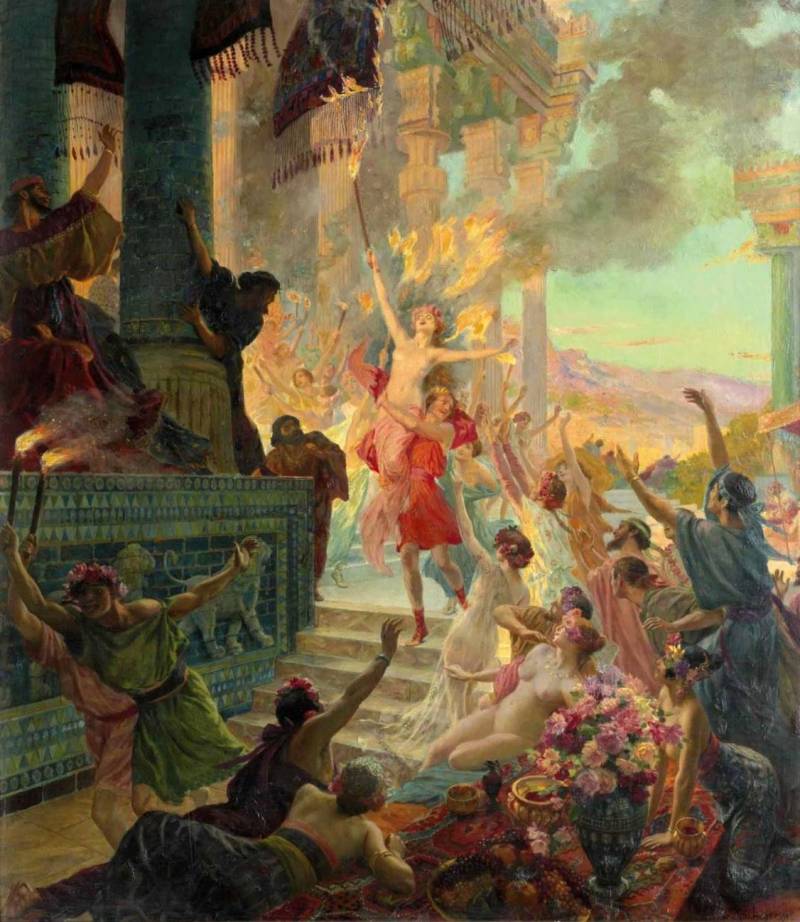
Georges-Antoine Rochegrosse. Incendie de Persepolis, 1890

Thais in a painting by Joshua Reynolds claimed to have posed for a famous London prostitute
Athenaeus tells about her further fate:
Thais of Athens also became the heroine of Menander's comedy.
By the way, another getter named Thais is known, who also lived in Egypt - already in the XNUMXrd century AD. e. Having repented, she was canonized, and later became the heroine of the novel by A. France and the opera by J. Massenet.

Saint Taisia of Thebaid on the icon of the XNUMXth century
Getera Campaspe, a native of the Thessalian city of Larissa, also became the favorite of Alexander the Great and Ptolemy I, as well as the model of Apelles. However, the first story about it is contained only in the writings of Pliny the Elder (Roman author of the XNUMXst century AD). Claudius Elian, who lived in the II-III centuries. n. e., claims that Campaspe became the first woman of the great Alexander. This message contradicts the testimony of Theophrastus, who studied with Aristotle at the same time as the heir to the Macedonian throne, that a certain Kalliksena introduced the future conqueror to the carnal love:
According to Pliny, who admired the beauty of Campaspa, Alexander the Great ordered Apelles to depict her naked. Pliny assures that this is how the painting “Aphrodite Anadyomene” appeared, but other authors, as we remember, believe that the hetera Phryne, already familiar to us, became the model for her.

Willem van Hacht. “Apelles draws Campaspe” (another name for the painting is “Alexander the Great in the studio of Apelles”)
In the process of work, the artist fell in love with his model, and Alexander generously gave him this hetaera.
They report about the passion for Campaspa and the teacher of Alexander himself - Aristotle. It was even said that he let her ride him. However, other authors claim that this "rider" was another hetaera - Herpilis, who gave birth to a son from Aristotle, to whom he bequeathed all his property. But still others claim that Aristotle was "saddled" by the Thracian princess Phyllida. This story became the subject of numerous medieval engravings, as an illustration of the victory of sensual pleasures over lofty philosophizing. You saw one of them at the beginning of the article. Look at another one:

Master of the Housebook. Aristotle and Phyllis, 1485
And this is a wooden sculpture of 1523 "Aristotle and Phyllis", which can be seen in the Bavarian town of Ottobeuren:
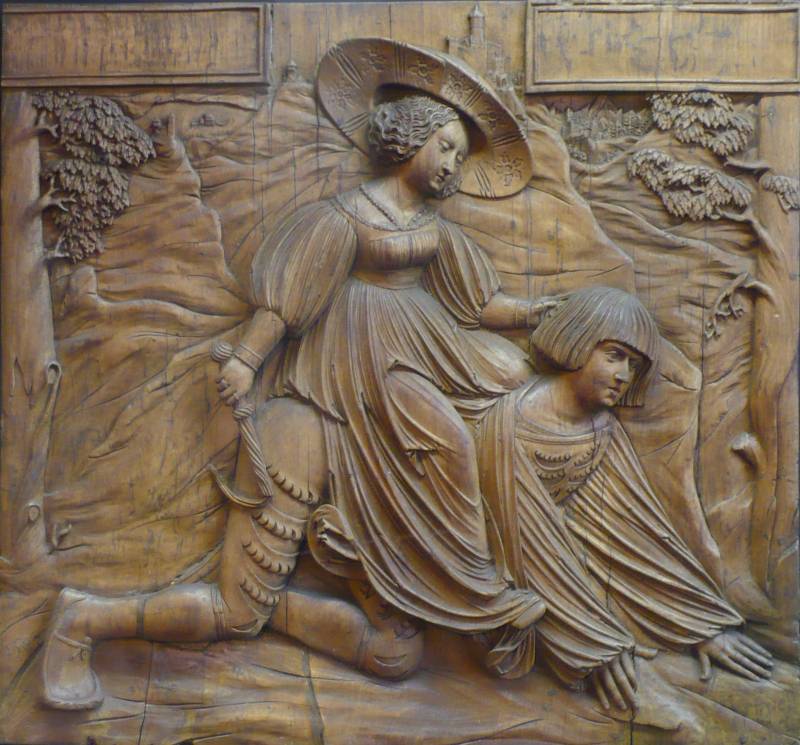
But back to Alexander the Great.
The greatest love of the great king, it seems, was Barsina. It was not a geter, but a woman of very noble origin and impeccable behavior - the daughter of the Persian exile Artabazus, the former ruler of Helespont Phrygia, the widow of the commanders of the Greek mercenaries of Persia Mentor and Memnon. Plutarch especially notes her good character. Barsina became the favorite of Alexander, who knew her from childhood, and was inseparably with him from 332 to 327. BC e. - before his marriage to Roxanne.
Her father was appointed king satrap of Bactria and Sogdiana. About 327 B.C. e. Barsina gave birth to a son from Alexander, who was named Hercules. The marriage of Alexander to Roxana did not lead to Barsina's disgrace. At the famous wedding in Susa (324 BC), her daughter by Mentor was given to Nearchus as a wife, and the sisters married Ptolemy and Eumenes.
The fate of Barsina and her son turned out to be very sad: Hercules, as a descendant and heir of Alexander, was very inconvenient for all the diadochi - the successors of the great king. And in 309 BC. e. Polyperchon, the former commander of the phalanx of Alexander, who at that moment ruled Corinth and Sicyon, in collusion with Cassander, the son of the general Antipater, ordered the death of both Barsina and Hercules.
"Scary Beast Lamia"
Demetrius Poliorketes (“Besieger of the City”), son of Antigonus One-Eyed, the famous commander of the kings Philip and Alexander, in 306 BC. e. captured the island of Cyprus, which previously belonged to the ruler of Egypt, Ptolemy I. Among his trophies were the son of Ptolemy Leontisk (his mother is called Thais of Athens) and hetaera Lamia, who, among other things, was also an excellent flutist. It was Lamia who went down in history as the “mistress of the heart” of this diadoch (who was only officially married 5 times). Plutarch writes about this woman:
By that time, Demetrius was already revered in Athens as a living god, the son of Poseidon and Aphrodite, in this policy altars were dedicated to him, hymns were sung in his honor. Demosthenes' nephew Demoharus claims that initially the Athenians also began to worship Lamia, and at the same time another mistress of Demetrius, Leena. And Polemon in his work “On the Painted Portico in Sicyon” reports that the Thebans also built temples to Aphrodite Lamia and Aphrodite Leena.
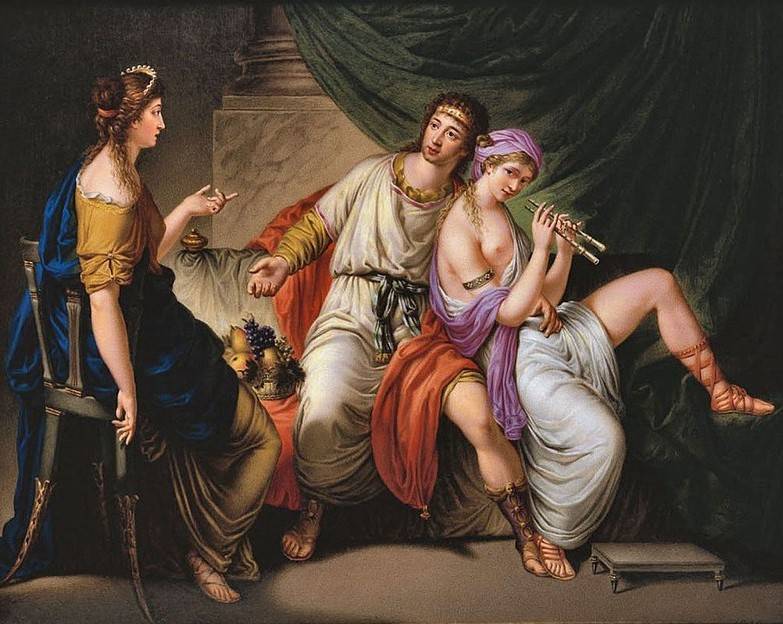
F. Kavcic, "Demetrius, Lamia and her friend Dema"
However, the attitude of the Athenians towards Lamia soon changed for the worse. The same Plutarch says:
The same author cites this anecdote:
Lamia gave birth to a daughter, Phila, from Demetrius, but in 302 BC. e. her name disappears from historical documents. Some believe that she died during childbirth.
Courtesans - hetaeras of the Renaissance
Many drew attention to the similarity of hetaerae with European courtesans of the Renaissance period - in the original sense of the word: Italian cortigiana and French courtisane literally translated into Russian mean "court". This was the name of the ladies living in the palaces of royalty, aristocrats and high prelates of the Catholic Church, who officially enjoyed the patronage of influential men - it was a matter of prestige, a demonstration of wealth and a high position in society.
A prince of the blood, a count or a cardinal simply had to buy thoroughbred horses, order blades only from the workshops of famous gunsmiths, splurge on luxurious clothes trimmed with sable or ermine furs, and maintain very expensive courtesans.
It is curious that the Italian courtesans were ordered to sit at the window with open breasts, demonstrating their charms to passers-by, and thereby increasing the prestige of their patron among the townspeople. Therefore, many portraits of unknown young ladies with bare breasts are considered portraits of courtesans.
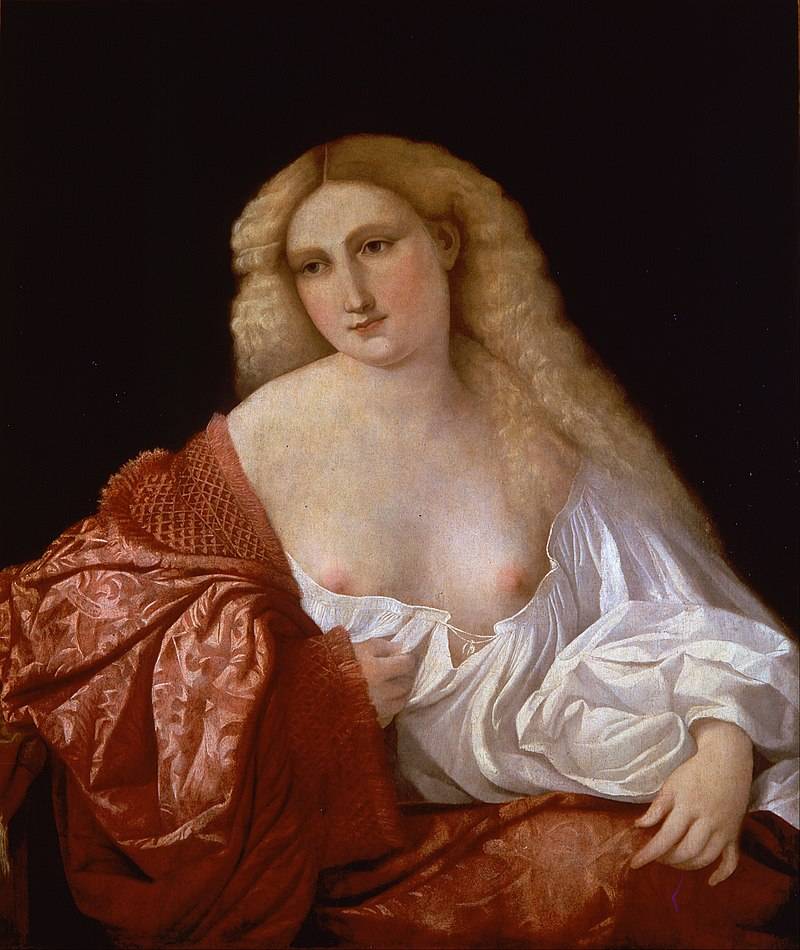
Courtesan in a portrait by Vecchio, circa 1520
Courtesans were fundamentally different from meretrices - banal kept mistresses. In terms of their level of education, many of them were not inferior to the ancient Greek getters. The famous Venetian courtesan Lucrezia, who had the nickname Madre manon vuole, according to Aretino, “knew all of Petrarch and Boccaccio and a lot of poems from Virgil, Horace, Ovid and many other authors, a huge number of poems in Latin.”
The first European courtesans were divided into two categories. Oneste ("honest" ladies) did not provide intimate services and were the mistresses of secular salons, performing representative functions. On their shoulders lay the responsibility for a decent reception and entertainment of the most sophisticated guests. And they did not avoid dilume intimacy with their patrons and, in order to maintain external decorum, they often entered into fictitious marriages with men who occupied a lower position in society than the persons with whom they were.
Information